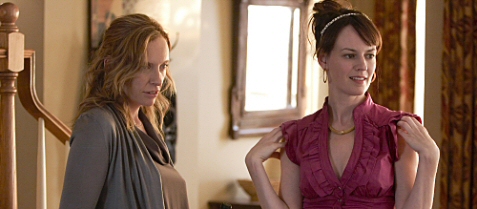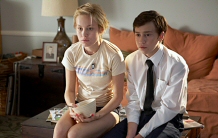The First Season
- Comedy
- 2009
- Buy the DVD
All photos © Showtime
Reviewed by Will Harris
()
iablo Cody earned ridiculous amounts of critical acclaim for her screenplay to “Juno,” culminating in an Academy Award for Best Original Screenplay, and in a testament to the ever-rising street cred of cable television, Cody’s first post-Oscar move was to team up with Steven Spielberg and create a series for Showtime which would serve as a starring vehicle for Toni Collette. Looking back at the preceding sentence, you will see several things which may lead you to suspect that the resulting series, “United States of Tara,” is one of the best things ever committed to television.
It isn’t. On the other hand, “United States of Tara” also isn’t as bad as its pilot episode would have you believe, but it sure is rough going for those first 30 minutes. The problem comes from taking a premise which would make a perfectly good drama –a suburban housewife with two teenage children suffers from Dissociative Identity Disorder – and trying to make a sitcom out of it.
When the series kicks off, Tara (Collette) has just gone off her meds, and although her family has supported this decision, it’s clear that they didn’t take into account just how much things were going to change as a result of the return of Tara’s additional identities: T, a horny teenager; Alice, a 1950s-style housewife; and Buck, a Vietnam vet who’s loud, obnoxious, and male. When Buck comes out to play just as the family is preparing to attend daughter Kate’s dance recital, Tara’s husband, Max (John Corbett), decides that the best way to handle the situation is to let Tara attend as Buck. Wacky hijinks ensue, and the whole thing plays out in a way that’s far more disconcerting than funny, a problem in no way aided by Collette’s decision to play both T and Buck in an extremely broad fashion. As “United States of Tara” continues, however, we soon learn that it’s possible for the series to succeed in spite of Collette.

Even as you watch the first episode, you’ll be aware that the most interesting part of the series isn’t Tara but, rather, her family. This expands considerably over the course of the first season. Max is trying to let his wife go off of her meds, but his libido is suffering due to his promise to not indulge in any sexual activity with Tara’s other identities, leaving him frustrated and sending him on a quest to find out what happened in Tara’s past that led to this disorder. Kate (Brie Larson) is sexually active, has questionable taste in men, and soon gets so mad at her mother that she takes a job as a hostess at a local restaurant called Barnabeez; she ends up becoming briefly smitten with her manager, Gene (Nathan Corrdry), a decision which proves to be a terrible mistake. Marshall (Keir Gilchirst) is Tara and Max’s son, and in addition to being a film geek of the highest order, he’s also gay and in love with a highly religious football player. Yikes. Expanding beyond the primary family, there’s also Tara’s sister, Charmaine (Rosemarie DeWitt), who’s forever been in the shadow of her sibling and is pretty pissed off about it.
As “United States of Tara” progresses, the mystery surrounding how Tara’s condition came to pass is interesting, and the addition of a new identity later in the season is also intriguing. The series also has a strong supporting cast driving it, including Patton Oswalt as one of Max’s co-workers (and Charmaine’s hook-ups) and Fred Ward and Pamela Reed as Tara’s parents, thereby providing another reason to keep coming back to the series. Still, there’s something very wrong about a series where the titular character is its least enjoyable part. Collette may have picked up the Emmy for Outstanding Lead Actress in a Comedy Series for her performance, but given how much more interesting everyone else on the show tends to be, Tara and her identities feel more like necessary evils than anything else.
Special Features: Diablo Cody contributes a couple of commentaries to the set, but that’s about the only thing you’ll find worthwhile about the bonus material. “Sitting Down with Diablo Cody” is just under three minutes long and manages to play up everything people hated about “Juno” in that time, while the brief look into Tara’s various identities offers precious little insight into the characters.
 |
 |
 |
 |
 |
 |
You can follow us on Twitter and Facebook for content updates. Also, sign up for our email list for weekly updates and check us out on Google+ as well.













